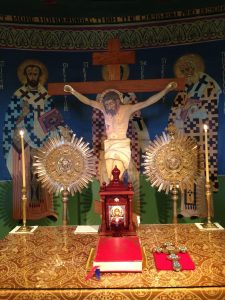 Today I sat in one of my favorite spots in the middle of my walk around Cooper Creek. It’s a stone picnic table sheltered under some tall pine trees overlooking the lake. Carolina Tarheel sky blue above with a whisp of clouds over the green earth and the undulating brown waters of the lake. Light infuses everything and as I collect my attention within, I have an embodied awareness of being part of it all. I am not separate from this life that is springing up out of nothing, called into being by the invisible Logos.
Today I sat in one of my favorite spots in the middle of my walk around Cooper Creek. It’s a stone picnic table sheltered under some tall pine trees overlooking the lake. Carolina Tarheel sky blue above with a whisp of clouds over the green earth and the undulating brown waters of the lake. Light infuses everything and as I collect my attention within, I have an embodied awareness of being part of it all. I am not separate from this life that is springing up out of nothing, called into being by the invisible Logos.
Sitting very still, intentionally and carefully watchful of body, mind and soul, without moving, perspective shifts in significant ways. St. Mark the Ascetic’s observation comes to mind. “When our mind and flesh are not in union, our state deteriorates.”[1] He instructs us to be intentionally still in every part of the body because, “the intellect cannot be still unless the body is still.”[2] St. Macarius of Egypt emphasizes the same. “Understanding cannot enter unless you practice stillness.”[3] Like the eternal present of the Kingdom of God, stillness is always right here “at hand,” waiting for us to enter, to desire it above all else, surrendering all our worldly desires and ambitions.
Most of us have tasted and confirmed the immense value of moments of spontaneous hesychia many times in our lives, yet the struggle with “heedlessness, carelessness and ignorance” continues. I avoid sustaining the intentional effort to be still and the collectedness I value, in favor of much lesser prizes that only dilute and dissipate me. It is a strange thing to spend your life fishing in a river that doesn’t contain the fish you want to catch when the fish is in another river right inside your heart.
St Ephraim the Syrian’s Psalter has become for me a favorite companion in this regard. His words bring comfort and encouragement in recognizing that this weakness of the human condition remains for us unto the end. In fact, the struggle with it appears to be an essential test in forging a true appetite and recognition of our need for Grace. The “crushed and humbled heart” arising from our defeats renders us ready to receive the Lord’s embrace. In his psalms St. Ephraim often speaks of the contradiction and fickleness of the human heart in spite of experiencing moments of sobriety and divine grace.
With the eyes of my heart have I seen the Lord sitting in great glory and I seemed to hear Him say to my soul; how can it be, O soul, that thou hast found thy heavenly bridal chamber, filled with the light of glory, abhorrent? How can it be that thou wast repelled by the good things that I have prepared for thee in the land of life? How can it be that thou hast become alienated from Me through indecent deeds and thoughts? How can it be that thou carest not to prepare thyself to stand worthily before Me in My coming? How can it be that thou dost not keep thy lamp ready in expectation of the call: Behold the bridegroom cometh—so that thou mightest go out to meet Me with joy? How can it be that thou takest no pains to prepare a proper wedding garment? How can it be that thou does not prepare thyself to enter with joy into the holy, heavenly bridal chamber? How can it be that thou does not join thyself to Me, Who have redeemed the from death?[4]
Sitting on the table looking outward and inward, earth, sky, water and light are alive and in constant motion, just as body, soul, heart and mind, but there is also a stillness from which all this movement arises. Keeping stillness in body and attentive silence in the inner world, allows things to clarify and simplify. After a time, new meanings begin to appear that aren’t visible to the senses and not noticeable when the slightest movement distracts. Something inside that is too often ignored begins to awaken a little and show interest.
Turning attention in the circular direction of being aware of being aware of the unified inner and outer landscapes, there is an increased vulnerability to being affected by a subtle kind of presence that makes itself known– apophatic, unseen and beyond the senses—something that I too rarely encounter because the quality of my attention is poor and my inner awareness is often eclipsed by constant activity, caught up in unbridled identification with various thoughts, captured by sights and sounds and objects of desire or worries that constantly demand more energy. In the automatic flow of those times and then the slothful recoil from them, no spontaneous doxology emerges because there is little vulnerability to the awareness of being truly present; of being gifted with life, as life.
St. Hesychius points out that when the mind actively struggles to let go of attachment to the outer senses and becomes aware of itself, “the five bodily senses, too, are freed from all external evil influences. It withdraws the senses almost completely into itself.”[5] In this momentary state of hesychia, while sitting silently and unmoving on the picnic table, with the senses drawn inside, there is nothing to “do” or accomplish. There are no tasks. No desires to be fulfilled; only attention to “what is”. A kind of wonder prevails. At some point a shift occurs away from being compulsively and automatically attracted outwardly “through” the senses. A different appetite arises out of a more intentionally mindful, embodied state. St. Isaac Syrian says, “Whenever the mind is drawn away by the senses, it also eats the food of beasts with them. But when the senses are drawn by the mind, they partake together with it of the sustenance of angels.”[6]
Here we are confronted with what may seem like a paradox of sorts. St. Isaac counsels that the door to the inner life of prayerful encounter begins by “forcing ourselves to be silent and then from out of this silence something is born that leads us into silence itself.”[7] This “forcing” is an ascetical action we can take to be mentally attentive and still in body. It is an inner command to draw the mind and senses out of imagination and within the body in stillness. And yet it is not this effort in and of itself which brings about the gift of prayer. For he also says, “so long as a man makes efforts, striving to force the spiritual to come down to him, it resists.”[8] One can and must be very still in the forest, sometimes for a very long time, before the deer of Grace will approach. No action of any kind can replace the humility of waiting in silence for the One we love. Surrender of all coercion is needed. In love there is only total self-offering and no ability to predict or demand a response. As Martin Laird wisely observes, “There is no way into the silence except surrender and there is no map of the silence that is surrender.”[9]
In this repeated re-collection of oneself, the senses are active but in the background, drawn within, as the inner world becomes more palpable. At some point a new kind of presence confronts me, coming from beyond what I am aware of. It is gentle, but unmistakable, like the first sunlight peeking over the horizon out of the darkness in the early moments before dawn. Gratefulness beyond words wells up instantly accompanied by tears in response to this Visitor. Now, for a moment, breathing itself and all that it flows through, is offered up to Christ.
Doxology. Anaphora. The Holy Altar where heaven and earth meet “is in all places and fills all things” invisibly present, waiting for the heart to serve the Liturgy within, to “commend ourselves, one another and our whole life to Christ our God”[10] as the prosphora and wine at any given moment. Our failure to fulfill our purpose as the royal priesthood making perpetual anaphora is our greatest grief, Adam’s unconsolable lament.
In the moment just before Jesus breathes his last breath uttering the words, “It is finished.[11] Into your hands I commit my Spirit,”[12] He passed through what he experienced as the abandonment of God.[13] At the moment just before his total surrender and self-offering in extreme humility, something extraordinary is hidden in plain sight. The Cross is the presence of God in humanity’s experience of God’s absence.
All who were seeking salvation from a Messiah who they thought would come in a spectacular way that would spare Himself and each of us from being afflicted by and suffering the helplessness and despair of the human condition by using superpowers to avoid it, were blind to the revelation of Eternal Love before them. They were looking in the wrong direction.
Passing by his agony on the Roman cross of shame and utter defeat, they “derided him wagging their heads and saying “You who are going to destroy the Temple and rebuild it in three days, save yourself. If you are the Son of God, come down from the cross.”[14] When some offered him something to drink, others said, “Leave him alone. Let us see if Elijah will come to save him!”[15]
What does it mean to be waiting for Elijah to come down from the sky in a blazing chariot of antidotes for all human suffering? To save us from discovering faith in the midst of the helplessness, pain and misery that are part of immaturity and a sign of the Creator’s patience and forbearance would deprive us of the very testing that begins to forge in us a real hunger and thirst for what the world cannot give us. It means we are still trying to find power and control over life rather than to enter into it as totally underserved gift. It means we prefer security and self-sufficiency over the vulnerability and creative playful abandon of being loved and loving. It means using activity to conquer stillness rather than allow stillness to be the source of the most powerful actions; the actions that are freely in union with the Holy Spirit.
It occurs to me that to the degree God is abandoned by man, in man’s self-centeredness and denial of responsibility, we experience this as an abandonment by God. For this reason, when Jesus asks why God has abandoned Him, each human heart, having even once tasted the fruit of divine Grace and beheld the beauty of the Lord, must ponder, as St. Ephraim did, how then O my soul can you turn away and sin again? The cry from our lips in response to the eternal love offered us in Christ’s humiliation should be, “My God, my God, why have I abandoned Thee?” The power of Christ’s mercy is revealed most clearly in His willingness to endure our abandonment of God as being His own.
_________________________________________
[1] Text from G.E.H. Palmer, Philip Sherrard, and Kallistos Ware (trans. and eds.) The Philokalia: The Complete Text, vol. I (Faber & Faber, London & Boston: 1979), 46. pp. 129.
[2] Palmer, G.E.H., Sherrard, P. and Ware, K. Philokalia Vol I, London: Faber & Faber. (1979) P128
[3] from the first Syriac Epistle, Appendix B, The Ascetical Homilies of Saint Isaac the Syrian, Holy Transfiguration Monastery, Boston, Massachusetts 2011, p. 160.
[4] St. Ephraim the Syrian, A Spiritual Psalter, Lincoln, TN: St. John Kronstadt Press P. 101.
[5] St. Hesychius the Priest, Philokalia, Vol. 1, 53. On watchfulness and holiness, pp. 171-172.
[6] St. Isaac the Syrian, The Ascetical Homilies. p. 144.
[7] Homily 64 The Ascetical Homilies of St. Isaac the Syrian, Holy Transfiguration Monastery.
[8] “Directions on Spiritual Training,” Early Fathers from the Philokalia, 150., p. 228.
[9] Martin Laird, Into the Silent Land: A Guide to the Christian Practice of Contemplation Oxford University Press: England, 2006, p. 3.
[10] From the Litany of the Divine Liturgy
[11] Jn 19:30.
[12] Lk 23:46.
[13] Mt 27:46
[14] Mt 27:39-40
[15] Mt 27:49



